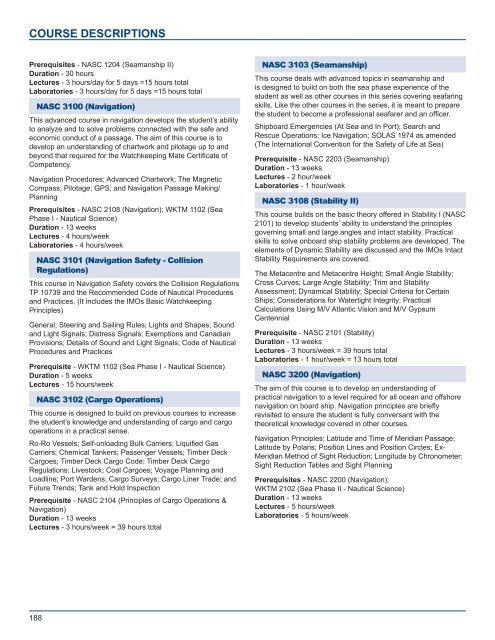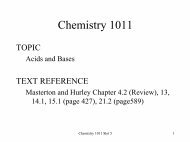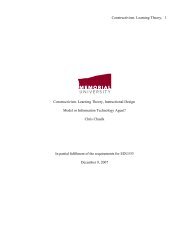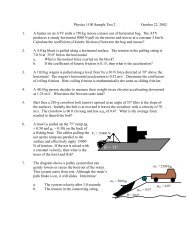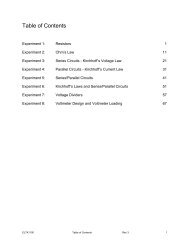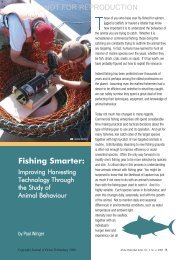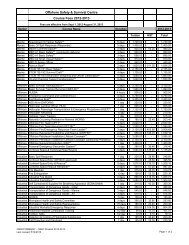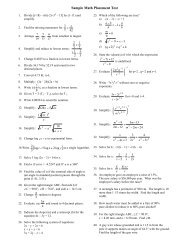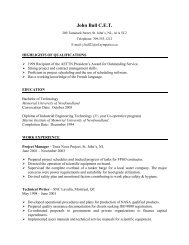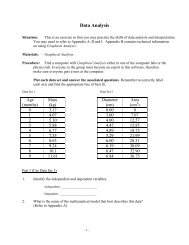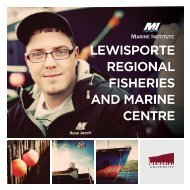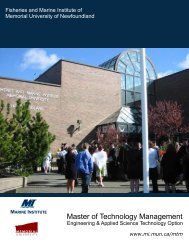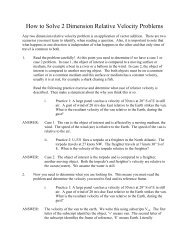Academic Calendar - Fisheries and Marine Institute - Memorial ...
Academic Calendar - Fisheries and Marine Institute - Memorial ...
Academic Calendar - Fisheries and Marine Institute - Memorial ...
You also want an ePaper? Increase the reach of your titles
YUMPU automatically turns print PDFs into web optimized ePapers that Google loves.
COURSE DESCRIPTIONS<br />
Prerequisites - NASC 1204 (Seamanship II)<br />
Duration - 30 hours<br />
Lectures - 3 hours/day for 5 days =15 hours total<br />
Laboratories - 3 hours/day for 5 days =15 hours total<br />
NASC 3100 (Navigation)<br />
This advanced course in navigation develops the student’s ability<br />
to analyze <strong>and</strong> to solve problems connected with the safe <strong>and</strong><br />
economic conduct of a passage. The aim of this course is to<br />
develop an underst<strong>and</strong>ing of chartwork <strong>and</strong> pilotage up to <strong>and</strong><br />
beyond that required for the Watchkeeping Mate Certificate of<br />
Competency.<br />
Navigation Procedures; Advanced Chartwork; The Magnetic<br />
Compass; Pilotage; GPS; <strong>and</strong> Navigation Passage Making/<br />
Planning<br />
Prerequisites - NASC 2108 (Navigation); WKTM 1102 (Sea<br />
Phase I - Nautical Science)<br />
Duration - 13 weeks<br />
Lectures - 4 hours/week<br />
Laboratories - 4 hours/week<br />
NASC 3101 (Navigation Safety - Collision<br />
Regulations)<br />
This course in Navigation Safety covers the Collision Regulations<br />
TP 10739 <strong>and</strong> the Recommended Code of Nautical Procedures<br />
<strong>and</strong> Practices. (It includes the IMOs Basic Watchkeeping<br />
Principles)<br />
General; Steering <strong>and</strong> Sailing Rules; Lights <strong>and</strong> Shapes; Sound<br />
<strong>and</strong> Light Signals; Distress Signals; Exemptions <strong>and</strong> Canadian<br />
Provisions; Details of Sound <strong>and</strong> Light Signals; Code of Nautical<br />
Procedures <strong>and</strong> Practices<br />
Prerequisite - WKTM 1102 (Sea Phase I - Nautical Science)<br />
Duration - 5 weeks<br />
Lectures - 15 hours/week<br />
NASC 3102 (Cargo Operations)<br />
This course is designed to build on previous courses to increase<br />
the student’s knowledge <strong>and</strong> underst<strong>and</strong>ing of cargo <strong>and</strong> cargo<br />
operations in a practical sense.<br />
Ro-Ro Vessels; Self-unloading Bulk Carriers; Liquified Gas<br />
Carriers; Chemical Tankers; Passenger Vessels; Timber Deck<br />
Cargoes; Timber Deck Cargo Code; Timber Deck Cargo<br />
Regulations; Livestock; Coal Cargoes; Voyage Planning <strong>and</strong><br />
Loadline; Port Wardens; Cargo Surveys; Cargo Liner Trade; <strong>and</strong><br />
Future Trends; Tank <strong>and</strong> Hold Inspection<br />
Prerequisite - NASC 2104 (Principles of Cargo Operations &<br />
Navigation)<br />
Duration - 13 weeks<br />
Lectures - 3 hours/week = 39 hours total<br />
NASC 3103 (Seamanship)<br />
This course deals with advanced topics in seamanship <strong>and</strong><br />
is designed to build on both the sea phase experience of the<br />
student as well as other courses in this series covering seafaring<br />
skills. Like the other courses in the series, it is meant to prepare<br />
the student to become a professional seafarer <strong>and</strong> an officer.<br />
Shipboard Emergencies (At Sea <strong>and</strong> In Port); Search <strong>and</strong><br />
Rescue Operations; Ice Navigation; SOLAS 1974 as amended<br />
(The International Convention for the Safety of Life at Sea)<br />
Prerequisite - NASC 2203 (Seamanship)<br />
Duration - 13 weeks<br />
Lectures - 2 hour/week<br />
Laboratories - 1 hour/week<br />
NASC 3108 (Stability II)<br />
This course builds on the basic theory offered in Stability I (NASC<br />
2101) to develop students’ ability to underst<strong>and</strong> the principles<br />
governing small <strong>and</strong> large angles <strong>and</strong> intact stability. Practical<br />
skills to solve onboard ship stability problems are developed. The<br />
elements of Dynamic Stability are discussed <strong>and</strong> the IMOs Intact<br />
Stability Requirements are covered.<br />
The Metacentre <strong>and</strong> Metacentre Height; Small Angle Stability;<br />
Cross Curves; Large Angle Stability; Trim <strong>and</strong> Stability<br />
Assessment; Dynamical Stability; Special Criteria for Certain<br />
Ships; Considerations for Watertight Integrity; Practical<br />
Calculations Using M/V Atlantic Vision <strong>and</strong> M/V Gypsum<br />
Centennial<br />
Prerequisite - NASC 2101 (Stability)<br />
Duration - 13 weeks<br />
Lectures - 3 hours/week = 39 hours total<br />
Laboratories - 1 hour/week = 13 hours total<br />
NASC 3200 (Navigation)<br />
The aim of this course is to develop an underst<strong>and</strong>ing of<br />
practical navigation to a level required for all ocean <strong>and</strong> offshore<br />
navigation on board ship. Navigation principles are briefly<br />
revisited to ensure the student is fully conversant with the<br />
theoretical knowledge covered in other courses.<br />
Navigation Principles; Latitude <strong>and</strong> Time of Meridian Passage;<br />
Latitude by Polaris; Position Lines <strong>and</strong> Position Circles; Ex-<br />
Meridian Method of Sight Reduction; Longitude by Chronometer;<br />
Sight Reduction Tables <strong>and</strong> Sight Planning<br />
Prerequisites - NASC 2200 (Navigation);<br />
WKTM 2102 (Sea Phase II - Nautical Science)<br />
Duration - 13 weeks<br />
Lectures - 5 hours/week<br />
Laboratories - 5 hours/week<br />
188


